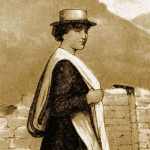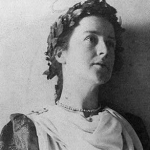When my devotions could not pierce
Thy silent ears,
Then was my heart broken, as was my verse;
My breast was full of fears
And disorder.
My bent thoughts, like a brittle bow,
Did fly asunder:
Each took his way; some would to pleasures go,
Some to the wars and thunder
Of alarms.
“As good go anywhere,” they say,
“As to benumb
Both knees and heart, in crying night and day,
Come, come, my god, O come!
But no hearing.”
O that thou shouldst give dust a tongue
To cry to thee,
And then not hear it crying! All day long
My heart was in my knee,
But no hearing.
Therefore my soul lay out of sight,
Untuned, unstrung:
My feeble spirit, unable to look right,
Like a nipped blossom, hung
Discontented.
O cheer and tune my heartless breast,
Defer no time;
That so thy favors granting my request,
They and my mind may chime,
And mend my rhyme.











Comment form: